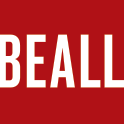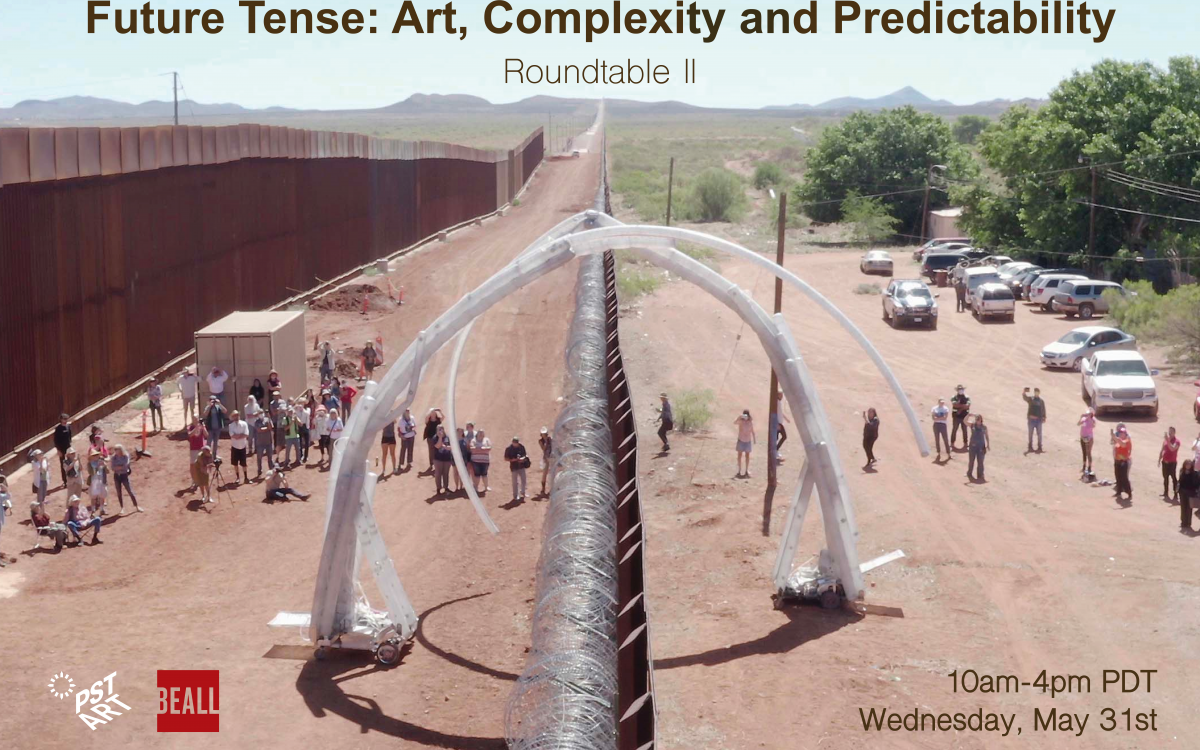Symposium | Future Tense: Art, Complexity, and Predictability
UCI Beall Center for Art + Technology is pleased to host a dialogue between artists, researchers and practitioners around future-building inquiry and scientific philosophy.
Guests are invited to learn about contemporary artistic experiments made in the field of complexity science, a school which weaves political, social, environmental and algorithmic systems into a singular ecology. Speakers will additionally share recent developments made in preparation for our Getty PST ART 2024 exhibition, Future Tense: Art, Complexity and Predictability.
Through interdisciplinary discussion, the Future Tense symposium will offer artistic models for living in a skein of contemporary systems–of forces increasingly entwined, unpredictable and urgent.
A complete symposium recording, zoom chat transcript and program can be viewed below.
__
__
Presenters include:
Jeff Barrett, UCI Chancellor's Professor of logic and philosophy of science, is concerned primarily with problems of collapse and measurement in quantum dynamical systems. His specialties lie in epistemologies of physics, game theory, decision theory, and evolutionary modeling of mathematical enquiry. In April of 2022, Barrett was inducted into the American Academy of Arts and Sciences; previous accolades include a Ph.D. designation with honors from Columbia University, UCI department chair role from 2009-14, UCI academic senate seat from 2019-2021 and editor-in-chief position at the peer-reviewed journal Philosophy of Science from 2009-17. Barrett currently serves on the advisory board of UCI Beall Center's PST ART 2024 exhibition.
Cesar & Lois is a collective of artists and researchers probing humanity’s relationship to nature and unfolding intersections between technological, biological and social systems. Run by media artists Cesar Baio (Brazil) and Lucy HG Solomon (California), the collective frequently involves a web of additional artists and scientists in their multidisciplinary experiments. The duo is currently working with the fungal colonization of human knowledge systems through the merging of fungal networks and Internet-based communications. The collective, founded in 2017, was the winner of the 2018 Lumen Prize in Artificial Intelligence, the 2019 selection for the Global Digital Art Prize Biennial in Singapore, and 2020 selection for the Aesthetica Prize shortlist. Through Beall Center’s Black Box residency program, Cesar & Lois is developing Hyphaenated, an experiment-as-artwork intended to capture interspecies signaling.
Harrison Studio, founded by the late Helen and Newton Harrison and continued by their son Joshua, takes as its starting point the rays of force that intersect within narrow loci–the watershed of Sante Fe, the Mediterranean Sea, the peninsulas of Europe. Their works take the form of research-based installations and interactive environments guided by the question, ‘How Big is Here?’ Equally micro and macro focused, their close examinations of subjects unveil larger apparatuses of political, economic, and social powers which exert their influence on environmental localities. Their work is held in the collections of the Pompidou Center, the Museum of Modern Art, and the Chicago Museum of Contemporary Art among others. In 2013, the Harrisons became the first recipients of the Corlis Benefideo Award for Imaginative Cartography. For Future Tense: Art, Complexity and Predictability, Harrison Studio is preparing Sensorium, the final and unrealized design of Helen and Newton Harrison.
Ellen Levy, New York-based, is often credited as a pioneer in the art of complexity science. Her practice traces the limit of chaotic systems, that fertile precarity known to spawn new forms of organization. Distinctive in in its color and dynamism, Levy's multimedia works collapse multigenerational technologies of imaging and assemble visuals from diverse fields. Reflecting Katherine Hayle’s understanding of posthuman complexity as a state both infinitely compressed and expansive, Levy articulates the time and space-warping transformations shaped by contemporary movement. She is the recipient of an arts commission from NASA, solo exhibitions at the National Technical Museum of the Czech Republic and New Britain Museum of American Art and group exhibitions at the Second Moscow Biennale, Boulder Museum of Contemporary Art and Field Museum. Levy currently serves on the advisory board of UCI Beall Center's PST ART exhibition.
Chico MacMurtrie marries traditions of soft sculpture and kinetic art, movements popularized concurrently in the 1960’s in reaction to expanding globalized electronic networks. He imbues the machine form with human sensibility, with “supple” gestures that emerge from empirical rationality.1 Through progressive developments in organic robotics, MacMurtrie arrives ultimately at a futurist technobody sensitive enough to approach. MacMurtrie/ARW’s works have been presented in major museums and cultural institutions around the world including the National Art Museum of China (NAMOC), Beijing; Hayward Gallery, London; Museo de la Reina Sofia, Madrid; Cité des Sciences et de l’Industrie, Paris; Museo Universitario de Arte Contemporaneo (MUAC), Mexico City; Pioneer Works, Brooklyn, NY; Shanghai Biennale; Muffatwerk, Munich (Pneuma World); Ex-Dogana, Rome, and ZHI Art Museum, Chengdu. Chico MacMurtrie is developing Dual Pneuma while in residency at the UCI Beall Center, an interactive inflatable sculpture intended for presentation in the 2024 Future Tense exhibition.
Laura Splan is a transdisciplinary artist expanding intersections of “Science, Technology, and Culture.” She creates conceptually layered and technically crafted work, exploring the biological sublime while unraveling its entanglements with infrastructure. Her work embodies biomedical artifacts through sensory encounters that amplify tactility, light, and sound. Often incorporating raw biodata or the materials of her own body, Splan’s interpolations shuttle between technological and organic systems, constructing an integrated posthuman landscape through translational acts. Her work has been presented at the Museum of Arts & Design, Pioneer Works, and New York Hall of Science and is held in the collections of Thoma Art Foundation, the Chan Zuckerberg Initiative, NYU’s Langone Art Collection, and the Berkeley Art Museum. For her presentation in Future Tense, Laura Splan is developing a sensory encounter with collaborators Adam Lamson, Danielle McPhatter and Hannah Lui Park.
Hege Tapio examines the self as a landscape for “extreme self-mining,” inserting her body into extractive apparatuses to derive energy and spectacle from her tissue. Through biosensor installations, video, performance, and a liquid fuel medium drawn from her body fat and urine, her work invokes renewed empathy for the complexity of human and inhuman actors. Tapio is the founder and director of i/o/lab – Center for Future Art where she has produced and curated a biennial from 2006-16. For her presentation in UCI Beall Center's Future Tense exhibition, she is developing EPHEMERAL, a semidermal implant designed to release synthetic emotions.
Gail Wight seeks to reveal and evolve the mechanistic-Universe model into a poetics of Gaia. Symmetries and intuitive capacities of the biosphere are expanded in Gail’s collages, forming a grammar of convergence. Her collaborations with scientists have explored such disparate inquiries as the symbiotic relation between gut microbes and the mind, the effects of wind in color theory, and the alien timescapes of lichen. Wight is honored by her recognition as the 2018 Silicon Valley Laureate and has exhibited work at the San Jose Institute of Contemporary Art, Queens Art Museum and Nevada Museum of Art. While in residence at UCI Beall Center’s Black Box program, Gail Wight has developed Ostracod Rising for the 2024 Future Tense exhibition.
__
Symposium Zoom Chat Transcript
UCI Beall Center PST Roundtable Program
Virtual; recording accessible below









